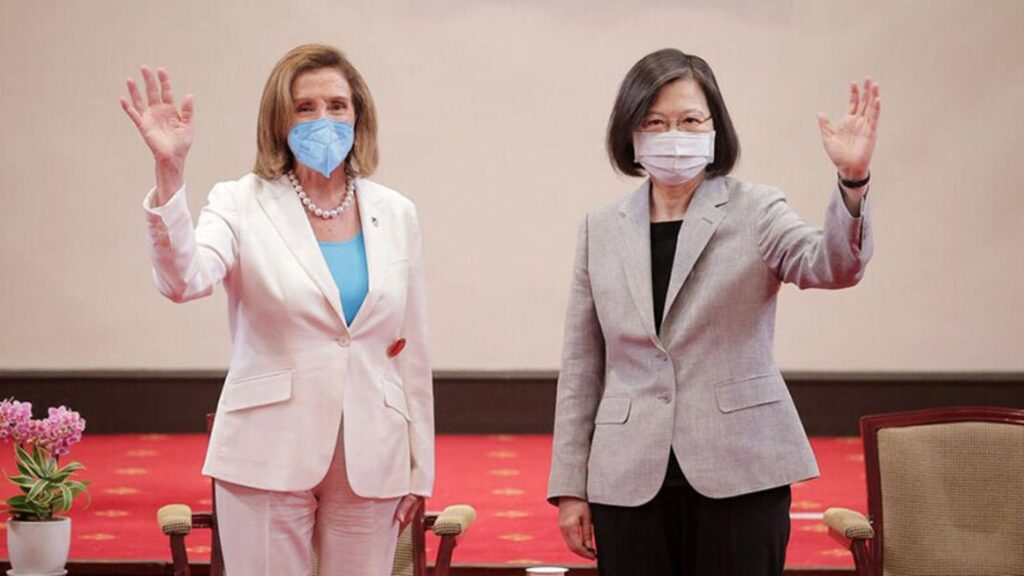
Taiwan may be 10,000km from East Africa, but whatever happens there could still hurt you. This is why a brawl between China and the US over Washington’s dalliance with Taipei could bring the region new worries.
It all began on Tuesday after US House Speaker Nancy Pelosi defied warnings from Beijing and landed in a military aircraft in Taipei. Pelosi told reporters she and her delegation were coming “in friendship to Taiwan, we come in peace to the region”. But this was the highest US official to arrive on the island for an official visit in more than 20 years.
On Wednesday, Wu Qian, spokesman of the Chinese Defense Ministry, accused Taiwan of playing to foreign actors.
“Such acts are very dangerous and will inevitably lead to serious consequences,” Wu said in a statement circulated to international media.
“The Chinese People’s Liberation Army is on high alert and will take a series of targeted military operations in response to resolutely safeguard China’s sovereignty and territorial integrity and thwart the interference by external forces and the separatist schemes for ‘Taiwan independence.”
An actual military clash between China and the US over Taiwan could plunge the eastern African region further into economic turmoil. Having struggled with Covid-19 lockdowns, and the attendant rising cost of basic commodities from the Russia-Ukraine war, another conflict could simply distract attention from Africa.
And as China has vowed to restrict the movement of goods from Taiwan, it may mean that anything you buy on these shores that has semiconductor chips in them may be costlier. Taiwan is the largest producer of semiconductor chips in the world, critical items that are already in short supply.
Both sides, however, know the cost of the war could be damaging and may get out of their control. But it has not stopped either side from using military might to deter another. In May, President Joe Biden said the US would intervene militarily if Beijing attacked Taipei. The White House later claimed the comments did not indicate a departure from Washington’s policy on China.
China maintains a legal claim on Taiwan, officially known as the Republic of China, as part of its territory and Beijing insists it is the only legal representative in China’s international affairs. In the last decade, Beijing’s diplomats have lobbied and threatened anyone who seeks official recognition of Taiwan.
In Africa, recent converts include Burkina Faso, which abandoned recognition of Taiwan in 2019. In fact, all of the East African regions acknowledge the One China policy with Beijing as the capital. Only the kingdom of Eswatini in Africa recognizes Taiwan. Somaliland last year established a diplomatic outpost in Taipei, but the breakaway region of Somalia also suffers from a lack of recognition.
Carrot-and-stick measure
In the past, African countries that tried to create an official status for Taiwan were threatened or excluded from Chinese programmes targeting the continent. This explains why Eswatini, for instance, is not part of the Forum on China-Africa Cooperation (FOCAC), Beijing’s tri-annual arena in which development programmes are discussed.
This year, a FOCAC meeting in Dakar, Senegal, saw China pledge another $60 billion worth of grants, loans and other programmes for Africa but Eswatini was excluded.
This kind of carrot-and-stick measure has seen Beijing get acknowledged by 181 of the 193 UN member states as the capital of the People’s Republic of China. And even though China often claims it has no strings attached to its foreign policy, it can send out an avalanche of punitive measures for those who undercut Beijing.
By Wednesday, Beijing had issued a map and coordinates to airlines and shipping lines, warning there will be “military exercises” around Taiwan, including areas as close as 20km to the island. The drills were to last from noon Beijing time (7 am EAT) on Thursday, August 4, to noon on August 7.
Beijing argues Pelosi’s trip violates the One China policy “and seriously infringes China’s sovereignty and territorial integrity.”
Before 1972, Taiwan used to be the official ‘China’ at the UN. Then African countries, including the whole of east Africa, agreed to Beijing’s campaign to depose Taipei from the UN Security Council.
According to Resolution 2758 of 1971, the People’s Republic of China, with its capital Beijing (then known as Peking), would be the overall legal authority over Chinese territory, including Taiwan.
In 1979, the US recognized the One China policy, although it still maintained unofficial relations with Taiwan, in what is colloquially known as ‘strategic ambiguity’.
“The United States of America recognises the Government of the People’s Republic of China as the sole legal Government of China … [but] the people of the United States will maintain cultural, commercial, and other unofficial relations with the people of Taiwan,” they agreed.
Both Beijing and Taipei claim there is only one China. But they can’t agree on who should govern it.
On Wednesday, Wang Yi, China’s state counsellor and minister for Foreign Affairs, said recognizing Beijing “is the key stabilizing force for peace and stability across the Taiwan Strait”.
